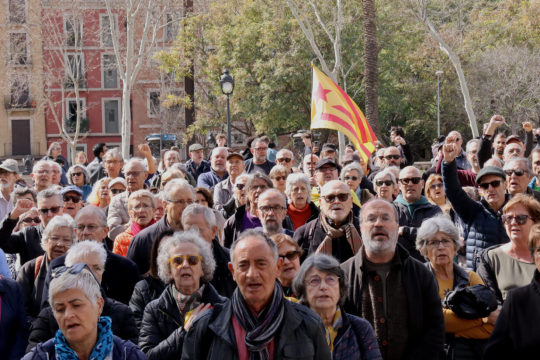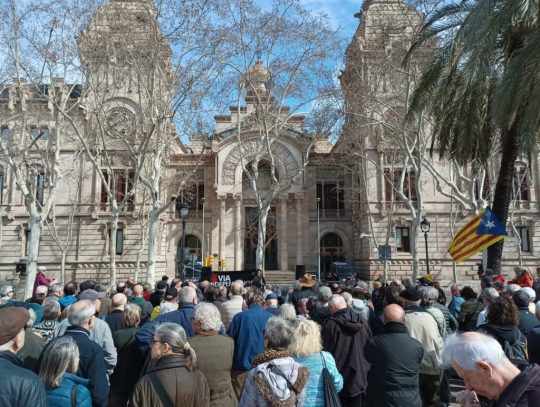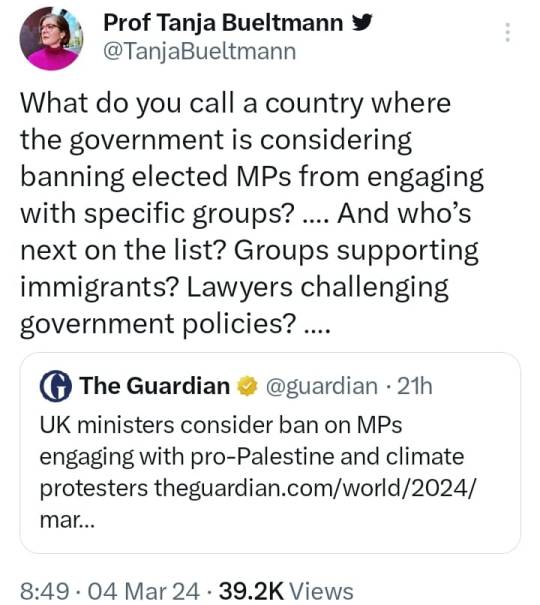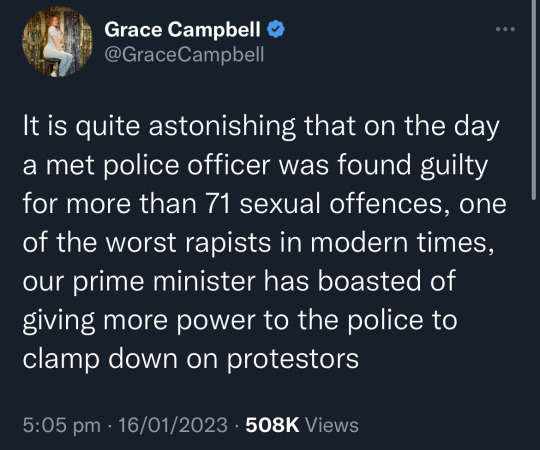#right to protest
Text
Now that the dust has settled a little bit on the arrests around the coronation, I want to talk a little bit about what this means for the future of protest and policing in England and Wales.
Firstly, I want to caveat this by saying the police have always hated protests. Getting arrested at a protest has always been a risk. Getting beaten up by the police as they try to provoke violence has always been a risk. At a recent anti-fascist counter protest I attended, two arrests were made. One of these later turned out to be “mistaken identity” (neither person was charged), but this is what we’ve always been dealing with.
However, I do think this idea of arrest for conspiracy to cause a public nuisance is dangerous. It’s essentially a thought crime. We think you might do something criminal, therefore we are going to arrest you. It has the power to significantly disrupt all sorts of actions, and we do need to be wary of it. The fact you can be arrested whilst walking to a protest, carrying a sign or a megaphone, and that this arrest *may* be legal (I hope some of those involved today try to sue for wrongful arrest, but we will see) means potentially some actions will never get started, and that is not good for the future of protest in this country.
I would never blame someone for their arrest- their arrest is the fault of the police and the police alone. That said, we know Republic were talking to cops about their plans. This did not protect them, and may have made it easier for the police to locate and arrest them. I think, on here, we all know talking to cops is a bad idea, but let’s say it again, louder for those at the back “DON’T TALK TO COPS”.
Now, the police say that the coronation is a once in a lifetime event, hence their response- blah blah- the police hate protest. If they get away with this, they will do it again, they will push things as far as they can to try and shut down protest they don’t agree with. This means we do need to be careful around OpSec etc. I also know people who don’t understand why e.g. antifa groups conceal their identity. But this is yet another good reason to do so. Black bloc, grey bloc, staying anonymous online, secure communications all of this is increasingly important- whilst also obviously trying to ensure good turn outs.
If the police are going to arrest you for walking to a protest with a megaphone, then what’s stopping us from being more violent/aggressive in our protest? I know some people are ideologically wedded to peaceful protest, but these actions are now potentially illegal too. So what’s stopping us? What is actually holding us back? If holding a sign is too much for them, if that’s on the level of smashing a window now, then what’s to stop us smashing windows?
Finally, I want to talk to the organisers of peaceful protests about police monitoring and post arrest support. In the past, many groups have felt this wasn’t needed. But now, it could be. If you’re organizing a protest of any kind, I strongly encourage you to get in touch with the Green and Black Cross for advice, and to arrange legal observers. Print out bust cards and distribute them. I’d also strongly encourage you to set up some post arrest support. It’s far better to have it, and not need it, than need it and not have it. If you’re concerned about police behaviour, you could also contact NetPol for advice.
Green and Black Cross: https://greenandblackcross.org/
NetPol: https://netpol.org/
#uk politics#coronation#protest#right to protest#fuck the police#fuck the king#not my king#pcsc bill#kill the bill#peaceful protest
1K notes
·
View notes
Text
instagram
Short version, they are trying to get rid of cash bail for things protesters and the very poor are likely to be arrested for. It also makes bail funds not a things as they'll be limited to posting bail thrice a year. It's a way to clear out protesters and render the 1st Amendment mostly a dead letter.
If you live in Georgia, please make your voice heard now, lest you lose the ability in future.
145 notes
·
View notes
Text


2nd February 2024. Photos from Vilaweb.
Demonstration in front of the High Court of Justice of Catalonia (the highest court of the Spanish judiciary system in Catalonia) in Barcelona in support of Dani Gallardo, a young Spanish anarchist who is sentenced to prison because the took part in a peaceful demonstration held in Madrid (Spain's capital city) in favour of Catalan people's right to self-determination and against the Spanish police's violence against Catalan people.
We have explained Dani's case before, you can read it in this post:
Dani has been sentenced guilty to send a message. Until his case, more than 4,200 Catalan people had been sentenced guilty for their involvement in the 2017 Catalan independence referendum or the protests that followed it. The Spanish judiciary system has proven that they won't stop at punishing Catalan people, they also sent the police to beat up the protestors who demonstrated for Catalonia in Madrid (Spain) and they're also jailing a Spanish man for his solidarity.
Dani was sentenced guilty of public disorder and attempt against authority with made-up claims that had been fabricated hours before he even got arrested. The Spanish police already planned to arrest people and blame them for this even before the event happened. Dani spent 13 months in pre-trial jail, then he was released for some time, and now has received the order to go to prison for 2 years and 11 months more.
Cases like this is why there is a demand for an amnesty. After the last elections to the Spanish government, the PSOE party needed the support of other parties to get enough votes to form government. One of the must-have demands of the Catalan political parties was an amnesty law (amnesty laws are not uncommon in Spain) that would cancel the punishments of people who have been found guilty of political crimes related to the independence movement since 2017, because none of these thousands of people committed real harmful crimes. This law is currently being negotiated, but the Spanish parties are trying to write it in a way that will leave as many people out of the amnesty as possible. At the same time, the Spanish judiciary system continues accusing new people of terrorism for attending peaceful political demonstrations.
For example, two democratically-elected pro-independence politicians (Puigdemont and Wagensberg) are being accused of terrorism for supposedly calling for people to protest in the Barcelona airport, a protest that was completely peaceful and which was called by a civil society organization and not by these politicians. But they're influential, so Spain looks for any way to punish them. How are the Spanish judiciaries claiming that Puigdemont and Wagensberg should be sentenced guilty of terrorism for an action where there was no terrorism? The Spanish judges' imagination has no limits when it comes to sentencing Catalans and Basques. They are saying that it's terrorism because some of the protestors had weapons. What weapons? Fire extinguishers, bottles, and the metal carts that people use to carry their luggage:

Because there were fire extinguishers and luggage carts in the airport and people brought their own water, a completely peaceful protest that happened there is terrorism. The worst part is that it doesn't outrage or surprise us anymore, because we're so used to this nonsense.
#actualitat#dani gallardo#catalunya#catalonia#spain#current events#right to protest#españa#european union#anarchist#political prisoners#political prisoner#madrid#barcelona#coses de la terra#catalan#independence#minority rights#social justice#civil rights
59 notes
·
View notes
Text
instagram
Ministers are considering expanding the definition of extremism and banning MPs from engaging with protest groups as part of a crackdown on people 'undermining' Britain’s institutions values.
According to reports, Prime Minister Rishi Sunak has asked Levelling Up Secretary Michael Gove to update the Government’s definition of extremism - set more than a decade ago - which currently defines it as 'vocal or active opposition to fundamental British values'.
That definition is vague enough - because what the hell are 'fundamental British values'? Essentially, whatever the Government of the day decides they are / are not. Clearly, though, Sunak wants even wider scope for his Government to define what is 'British' according to their own priorities. For example, I wouldn't mind betting that, while it's clear anti-genocide groups will be labelled un-British, anti-trans campaign groups will somehow pass under the radar.
Combined with Sunak's threat in front of Downing Street on Friday that non-British nationals who take part in protests could be deported, this signals a worrying new advance in the assault on civil rights and civil liberties, promoted by the Conservatives and unopposed by Labour.
37 notes
·
View notes
Text

I see No. 10 is now taking lessons from the Kremlin.
31 notes
·
View notes
Text
"An intense interaction between allies and members of the LGBTQ community and a religious group got heated and loud according to attendees.
The tensions and volume escalated on the afternoon of Feb. 12 outside the Canyon Meadows pool.
Bylaw and Calgary police officers said neighbourhood complaints and overall concern had police crews respond.
[...]
Two tickets were issued for the excessive noise to the protesters, though the street harassment fines remain under consideration."
Full article
Tagging: @politicsofcanada
#cdnpoli#canadian politics#canada#canadian news#canadian#protests#calgary#alberta#counter-protests#lgbt+#lgbtq+#lgbt#lgbtq#homophobia#transphobia#right to protest
188 notes
·
View notes
Text
Manchester - Saturday 10th February 2024
It’s this amazing energy that keeps me going when I’m tired. We cannot give up. We have to keep boycotting, keep protesting, keep being loud. 🇵🇸❤️ Free free Palestine
#free palestine#pro palestine#gaza#share#help gaza#palestine#world#share this#from the river to the sea palestine will be free#rafah#right to protest#uk pro palestinian#uk pro palestine#uk against genocide#manchester protest#Manchester March#activism#important#keep boycotting#keep protesting#boost#mcr protest#mcr pro Palestine#🇵🇸#end the occupation now#end the occupation#Gaza ceasefire#ceasefire now
29 notes
·
View notes
Text
non-disruptive protest doesn't work.
aside from the fact that the point of a protest is to cause enough disruption that the government is forced to concede, there's also another element to this that i personally feel is more prevalent, especially these days with governments across the world cracking down on protest rights.
the way i see it, as do many others on the left, is that if protest is meant to force the hand of the state via disruption, but the state is the one to define what "acceptable" protest is, then there would never be a protest that works, as the state will inevitably only define protests that don't threaten the status quo as acceptable, thus preventing any real change from happening.
#socialism#communism#marxism#socialist#anarchism#leftist#leftism#communist#left wing#ancom#protest politics#right to protest#capitalism is killing us#killthebill#kill the bill#libertarian socialism#anti capitalism#anticapitalism#anti fascism#leftblr#comunism#queer anarchism#anarchocommunism#anarcho communism#left unity#leftwing#marxist leninist#marxist#antifa#antiwar
490 notes
·
View notes
Text
14 notes
·
View notes
Text
Rishi Sunak's speech yesterday about the need to "protect democracy" is incredibly rich coming from an unelected PM, and it proves the closeness we are to despotism.
I am speaking from someone who partly grew up under a dictatorship. In some ways, I actually think that we're entering an even scarier era. Where I was growing up, at least officials were open about their regime. Yes, they made their people suffer greatly. But they did it openly. Still very horrible, but fascism under the disguise of democracy is, in my mind, more dangerous. And so very near.
Sunak's speech, filled with falsities, continued what his government have parroted ever since October in reaction to what is happening in Israel and Palestine. And that is the broadening of the definition of extremism to encompass dissenting voices, potentially criminalising those opposing political and financial support for Israel. That's not an exaggeration. Sunak said as much in his rambling speech.
A ceasefire should be the minimum expectation, yet leaders of the 'free world' can't even support that. If we lived in a just world, we'd have sanctions, trials and prosecutions. We'd have an end of diplomatic ties and an end of the occupation. We'd have war reparations, restoration of land and a right of return for all Palestinians.
This week, we've witnessed the extreme act of protest in the form of self-immolation, which saw a US air force airman dousing himself in gasoline outside the Israeli embassy in Washington and lighting himself on fire. Days later, the IDF targeted Palestinians seeking aid and food after killing over 30,000 of them. It's very concerning that 24 hours after the most grotesque image of someone being bulldozed by a clearly labelled IDF tank went viral on social media, that was the statement Sunak chose to make.
And yes, his speech is in reaction to what is happening in the Middle East, but its implications go beyond. His words run deep even if the current situation was magically solved tomorrow. The very act of protesting is under threat, making his lecturing on division exploitation outside Downing Street hypocritical, considering that is the driving force behind his government. He is right. There is a group in the UK fostering extremism and threatening democratic freedoms – the Conservative Party led by him. Sunak's warnings about extremism would carry more weight if his tenure as prime minister hadn't consistently promoted it.
His speech also included an endorsement of Voter ID, disenfranchising thousands. You cannot claim to protect democracy by making it harder for people to vote. The man, who again became PM through clearing and without a public vote, also said that people voting for an MP he disagrees with is an attack on democracy. It's like we're living in a dystopian satire that not even the greatest writers of our time could imagine.
And Sunak's assertion that Britain has never been on the wrong side of history in his concluding remarks is particularly troubling, considering his background and lack of acknowledgement for his ancestors who endured colonial rule for nearly 90 years in British India.
The worst part? Sunak is just one of many. If he goes, there is someone next in line to replace him and crackdown even further.
It's like playing an endless game of whack-a-mole. You get rid of one, but another pops up, and then another and another and another until we all get sicker, poorer, and sadder and die.
#rishi sunak#democracy#gaza#palestine#geopolitics#protest#right to protest#i hate doing tags#writing this has made me miserable
10 notes
·
View notes
Text

#grace campbell#political twitter#right to protest#met police#conservative party#uk news#uk politics#uk law#anti strike laws#anti protest laws
70 notes
·
View notes
Link
Demonstrations across the country have called for her resignation, but Boluarte has responded with hostile rhetoric and a heavy-handed crackdown. So far, at least 60 people have been killed in the upheaval.
The situation in the country is quite complex. To understand what is happening, we have to look at old rural-urban, racist, and classist faultlines which are currently feeding the growing polarisation in Peruvian society.
Deep faultines
These protests have highlighted issues of racism, classism, and centralism which have created significant divisions within society and which have remained unaddressed for decades. Tensions between the rural poor and Indigenous people and the rich elites in Lima have historically run high – and for a reason.
Illiterate people in Peru did not have voting rights until 1979; this meant that the rural and Indigenous population was overwhelmingly disenfranchised for most of the 20th century.
.......
#Peru unrest#Peru protests#Peru#Peru social crisis#Peru self-serving Congress#Peru corrupt congress#indigenous#indigenous repression#human rights#right to protest#dina boluarte resignation
68 notes
·
View notes
Text
The authoritarian underbelly of self-proclaimed democracies is often hidden, but it’s there nonetheless. That undercover police officers infiltrated environmental groups with fake identities for years, even having protracted relationships with female activists under false pretences, seems more reminiscent of a Stasi state than a liberal democracy. But it did happen here, and it was able to happen because such groups were cast as extreme menaces for whom democratic norms could be easily discarded.
Excellent again by Owen Jones.
8 notes
·
View notes